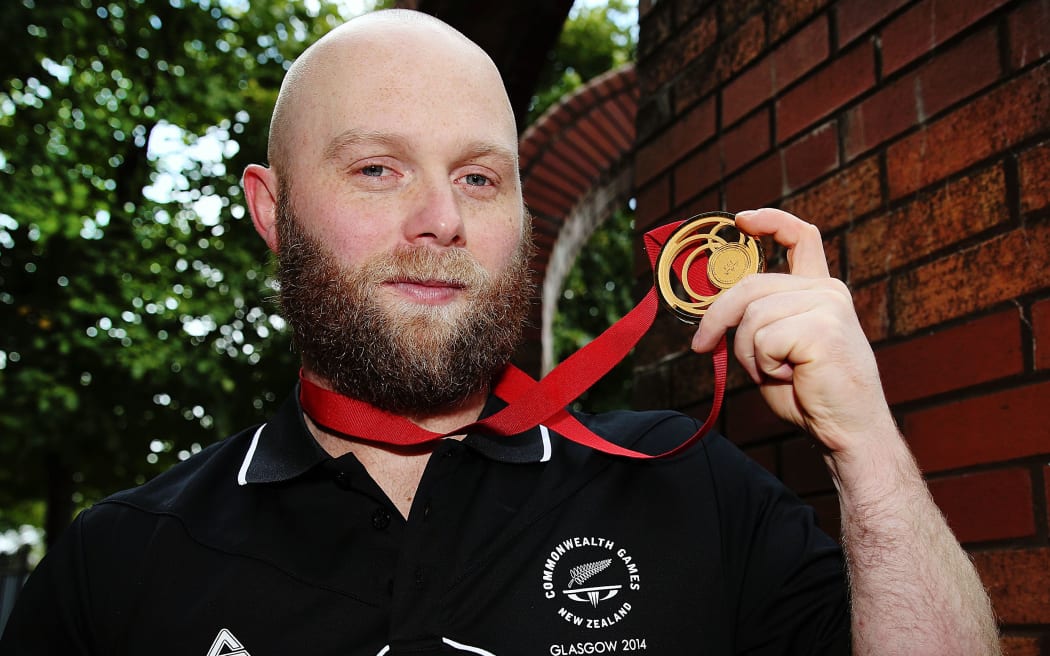Olympic Disciplines - Weightlifting is an athletic discipline in the modern Olympic programme in which the athlete attempts a maximum-weight single lift of a barbell loaded with weight plates.

New Zealand Weightlifter Richard Patterson with his gold medal for the Men's 85kg class. Glasgow 2014 Commonwealth Games. Photo: Photosport
Two New Zealand weightlifters have been selected for Rio
The Glasgow Commonwealth Games Gold medallist, Richie Patterson, has secured his spot in the men's 85kg division.
Patterson joins the great Don Oliver in being the only New Zealand weightlifter to be selected for three Olympic Games.
Joining him in the team will be Tracey Lambrechs, who claimed a bronze medal in Glasgow, and will compete in the women's +75kg division.
Competition at Rio
When: Competition will take place over 10 days from 7-14 August 2016 (with no competition on 15 August).
Men will compete in eight events based on athlete weight categories, from under 56kg to the super-heavyweights at over 105kg.
Women compete for seven gold medals, from under 48kg to over 75kg.
Each weight category is an event and all competitions are finals.
How are the Events Run?
For each weight category (event) there are two competition lifts - the snatch and the clean and jerk.
Each weightlifter receives three attempts in each, and the combined total of the highest two successful lifts determines the overall result within a bodyweight category.
The barbell is loaded in progression, with the competitor taking the lowest weight lifting first.
Athletes/coaches have to announce the next weight that the athlete will lift and this can be modified twice before lifting.
Automatic progression after any successful attempt for the same athlete must be a minimum of 1kg.
Athletes have 1 minute to perform (or 2 minutes taking consecutive attempts).
After the snatch there is a 10 minute break before the clean and jerk starts.
A lifter who fails to complete at least one successful snatch and one successful clean and jerk also fails to total, and therefore receives an 'incomplete' entry for the competition.
The Stars of Olympic Weightlifting
In the 1950s, the Soviet Union's weightlifters rose to prominence and stayed there until the 1990s when China, Turkey, Greece and Iran catapulted to the lead.
In the women's field, China has been dominant but other countries, notably North Korea, have strengthened in recent years.
Recent world champions to watch out for at Rio include Ilya Ilyin from Kazakstan, double Olympic champion and world record-holder in the men's 105kg, Kianoush Rostami from Iran who won the 85kg category, Guoshun Zhong and Liu Xiaojun (77kg) and Hui Liao from China (69kg), and the North Koreans Un Guk Kim and Yun Chol Om in the lighter weight categories.
In the women's competition Tatiana Kashirina from Russia is expected to be a star performer, after setting five world records on her way to victory in the women's super-heavyweight category, and China's Wei Deng in the 63kg and Mengrong Deng in the 58kg categories (both gold medalists at the 2014 World Championships) will be vying for medals.
Did you Know?
The lifts performed at the Olympic Games, and in particular component lifts (eg, squats, deadlifts, cleans), are commonly used by elite athletes in other sports to train for both explosive and functional strength.
Super-heavyweight lifters normally claim the title of World's Strongest Man or Woman. However, kilo for kilo, the lightest weightlifter is often the strongest.
The apparent simplicity of lifting the barbell from the ground and over the head in one or two movements is deceptive. Weightlifting is a highly technical sport that demands speed and mobility, as well as raw strength.
A randomly generated lot number is drawn for each competitor, which then generates the order of the weigh-ins.

